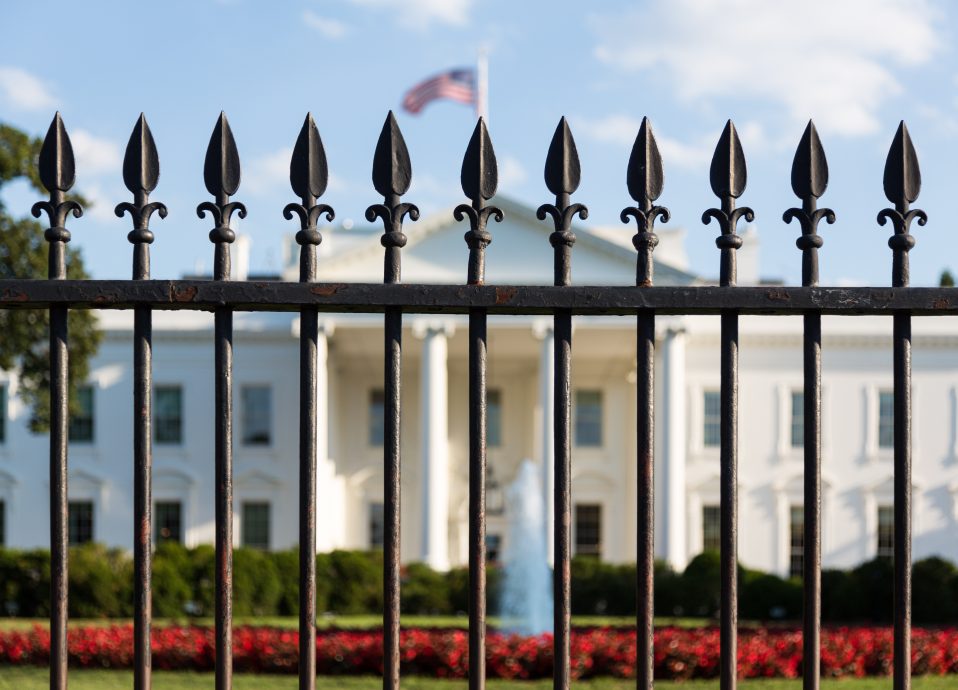A Brief Window to Reduce Presidential Power
First, in the truest tradition of conservative thought, the bad news: At this time on Wednesday, one of the major parties in American politics will be institutionally invested in inflating a presidential office already swollen beyond healthy constitutional proportions.
Now the good: For the next 48 hours, each of them is terrified it will be the other. The tightening presidential contest opens a constitutional window, briefly. The rational response to a campaign this close is bilateral constitutional arms reduction: both parties agreeing, before the votes are counted, to deflate the power of the Presidency.
Such an agreement, like that between gunslingers facing off on a Western street, would require two absent mechanisms: trust and enforcement. Moreover, the sheer power of the presidency—which Hamilton could not have predicted when he proclaimed, cue the laugh track, the “moral certainty, that the office of president will seldom fall to the lot of any man who is not in an eminent degree endowed with the requisite qualifications”—probably induces irrational risk-taking, such that the enticements of exploiting a hyper-powerful office make, at least in the moment’s heat, the risk of being exploited by it seem bearable.
It is already evident enough that the allures of power have warped the judgment of several of those in both parties—witness, for example, the lexical contortions entailed in the efforts of otherwise intelligent people to distinguish between “supporting” a presidential aspirant and “endorsing” him—but should there remain sufficient sobriety for a reduction of presidential arms, the contours of an agreement might include both parties promising the following.
First, the next President disclaims a systematic power to suspend enforcement of laws or provisions of them in order to derange policy schemes of Congress. That is, the President will not make policy through prosecutorial discretion or other means of non-enforcement.
As Adam J. White has noted in this space, the Presidential discretion not to enforce laws is a well accepted “constitutional safety valve.” But it is, as he explains, that: first, constitutional, rather than a tool of policy, and second, a safety valve, not the main plumbing. A refusal to enforce laws should be reserved for exceptional and, crucially, constitutional objections.
Similarly, the President will interpret laws of Congress in accord with their plain intent and the obvious meaning of words. If he or she wishes to make policy, the forum for doing so will be Congress itself, not, like variations on a poetic theme, new administrative interpretations of existing statutes. Witness the Department of Education’s “guidance” to “help” schools comply with Title IX by interpreting that law’s ban on sex discrimination in education to apply to assertions of gender identity. This is “guidance” by dictation and “helping” by threatening to withhold federal funds, and it is, in any event, rooted in a preposterous claim about the law.
Next, in exchange for Congress renouncing omnibus legislation, the next President will veto laws to which he or she constitutionally objects rather than signing them and issuing statements that essentially declare parts of them not to be binding. In fairness to Presidents, omnibus bills that pile multiple issues into one measure can create impossible dilemmas in which, to obtain what they cannot forgo, they must also accept what they cannot countenance. But Presidents Bush and Obama have also used signing statements to create a de facto line-item veto that allows them to pull end-runs around Congress. Speaking of which:
The President agrees to submit to the Senate, for ratification as treaties, any agreements with foreign nations that impose substantial obligations on the United States. Executive “agreements,” whether the status of forces agreement with Iraq in 2008 or the Paris agreement on climate change in 2016, circumvent the Senate’s authority to advise and consent to treaties.
To be sure, Senate confirmation of treaties is often difficult to obtain. It is supposed to be. Requiring it would, as Article II, Section 2, stipulates, encourage Presidents to make treaties “by and with the advice and consent of the Senate” (emphasis added). This authority, like most of the express powers of the President, is shared with Congress.
Finally, in any case in which a sustained and serious military operation is openly contemplated for any substantial duration, the President and Congress will at least confer on the propriety of a declaration of war. A resuscitation of Congress’ war power would act as a brake on precipitate uses of the military, introduce a broader range of perspectives closer to the public that would bear the burdens of war, and do Presidents the favor of sharing accountability for the decision to go to war. It would also help to revive Congress as an institution.
To be sure, all of these elements of an agreement entail discretion, and each can be easily evaded. That makes it all the more telling that it would be so difficult even to obtain agreement on this much, which is to say agreement on the Constitution on which we already agreed and to which the next President will take an oath.
Bilateral constitutional arms reduction approaches the plate with two strikes already called: It is “constitutional,” which is a mode of discourse disfavored compared to political expediency, and it “reduces” that which it has become the deranged obsession of the Presidency to augment: power. One effect of the separation of powers is to reduce the stakes of single elections, since the entire apparatus of power can never be captured in one of them. The contemporary Presidency, the impetuous vortex into which power has, against Madison’s prediction, been diverted, now allows too many chips to accumulate on the table in a single hand.
On the other hand, courtesy of tightening polls, a window has opened. For the briefest of times, no one knows in whose hands that power will lie, supplying a vivid illustration of the axiom that one should never permit the exercise of an authority one would not entrust to someone with whom one disagrees. Two days from now, one side will be opportunistically unwilling to reduce the power of the Presidency. At this moment, it is precisely for opportunistic reasons that both should.


